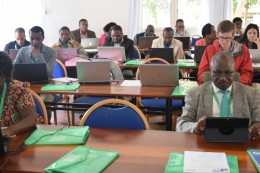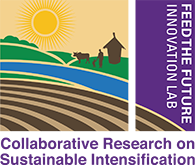Arusha, Tanzania – August, 15-19
The Geospatial and Farming Systems Research Consortium (GSFRC) kicked off its workshop series in Arusha, Tanzania with 46 early-career research and development professionals from across East Africa gathering to advance their skills in programming, modeling and mapping of spatial data. The workshop was organized by the Feed the Future Sustainable Intensification Innovation Lab, the African Soil Information Service and the International Center for Tropical Agriculture.
Over 300 people applied to attend the workshop and 46 of East Africa’s up-and-coming researchers were selected to attend; each showing both motivation and applicability of this training to their work. The training was free of charge and lodging and meals were provided. Participants traveled from Rwanda, Ethiopia, Kenya, Uganda, Mozambique, and Tanzania and had backgrounds ranging from agronomy, plant breeding and soil scientists to hydrology, climatology, wildlife conservation and virology.
This five-day, hands-on workshop on data science for agricultural development covered an introduction to R software and how to use R for data analysis and modeling with an emphasis on spatial data. Continue reading “East African Researchers Attend Spatial Data Workshop Series in Tanzania”


